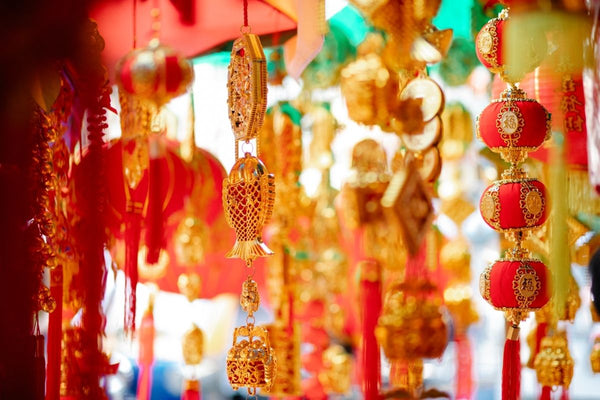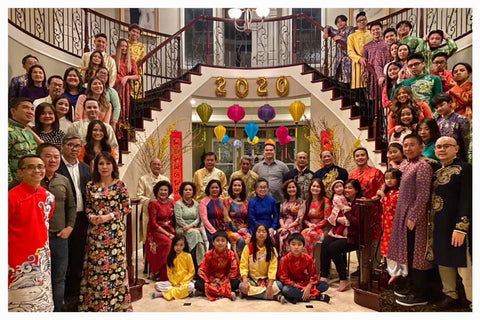
One of the most important and widely celebrated world holidays is upon us: Lunar New Year!
Though commonly referred to as Chinese New Year, this vibrant holiday is celebrated in many regions of Asia; including Korea, Vietnam and Singapore! Lively celebrations center around feasting, ancient traditions, and paying tribute to elders and spiritual deities.
Based on the lunar calendar, this holiday is tied to moon cycles, and the date varies slightly from year to year. In 2022, Lunar New Year begins on Tuesday, February 1st and is now known as the Year of the Tiger. Keeping in line with the tiger's spirit, this year's Lunar New Year celebrations will be marked by boldness, adventure, and strength.
In this post, we'll specifically be focusing on Chinese celebrations and traditions, but Lunar New Year is one of the most important holidays for over 1 billion people across Asia and the rest of the world!

Preparations
Preparations for Lunar New Year start on the 23rd day of the 12th month of the Chinese lunar calendar — eight days before Chinese New Year's Day.
During these first days, tradition dictates that people thoroughly clean their homes and shop for the holiday. Every household chore imaginable is carried out, from sweeping to cleaning all linens.
At the same time, families shop for new clothes, decorations, fireworks, and specialty foods for the upcoming feasts. The Lunar New Year is very similar to Christmas in that regard.
This process of cleaning and shopping is called "sweeping away the dust," meant to symbolize closing out the current year and welcoming the new one into their homes.
It's important to do these tasks before the New Year, because superstition says it can be viewed as sweeping one's good luck and fortune away otherwise.
As the saying goes, out with the old, in with the new.
Decorating
Next, people decorate their homes with red lanterns and red paper spring scrolls for good luck. Most people do this on Lunar New Year's Eve, but some households decorate several days before.
Often adorned with sayings such as "prosperity" and "good fortune," these red decorations are meant to keep evil away. Being the Year of the Tiger, tigers will likely be a main focal point as well.

New Year's Eve Family Reunion Feast
The reunion dinner is one of the most important events during Lunar New Year. It marks the official beginning of Lunar New Year, and family members often travel from great distances to be together.
Families serve several traditional dishes during the reunion feast, each of them holding a symbolic lucky meaning. For example, dumplings symbolize wealth and abundance because they resemble coin purses.
Similarly, long noodles represent longevity and whole fish symbolizes prosperity. The Mandarin Chinese word for fish, yú, actually means "surplus," so many families consider it to be the single most important dish.
Red Envelopes
After the reunion feast, it's time for a favorite Lunar New Year tradition: gifting red envelopes.
Elders give their children and grandchildren small red envelopes, typically with money inside. Tradition says that if you put the money under your pillow for awhile, rather than spend it, you'll enjoy good health and youthfulness.
Firecrackers
It is customary for families to stay up late visiting on Lunar New Year's Eve. This practice is called shousui, "to watch over the new year."
At midnight, everyone sets off all kinds of fireworks and firecrackers. Chinese people believe that the bigger, louder, and longer the displays go on, the better it will be for families and businesses in the new year.
Wearing New Clothes and Visiting Elders
On the first day of Chinese New Year, people put on new clothing to represent a fresh start for the year.
Families also go around visiting their elders and delivering New Year's greetings, wishing good health, luck, and happiness.
Lion Dances
At some point on Lunar New Year's Day, most people watch traditional Chinese lion dances. Community organizations, local theaters, schools, and churches all host their own versions, and the dances also air on TV.

Public Celebrations
From Lunar New Year's Day to the end of the festival, you'll find fairs and other celebrations in city parks. These festivities include parades, traditional dances and other performances, plenty of special foods, street vendors, and more.
Visiting Relatives
From the second through the seventh days of Lunar New Year, people spend lots of time visiting their loved ones.
On the second day, many people make offerings to the God of Wealth, in hopes of attracting prosperity. Married daughters also visit their parents on this day, bringing red envelopes and other gifts.
Return to Work
Most people resume daily life on the eighth day of Lunar New Year, as 8 is the luckiest number in Chinese mythology.
Chinese Lantern Festival
The Chinese Lantern Festival, held on the the 15th day of the New Year, is the traditional end to the festivities. People release thousands of glowing lanterns, either into the sky or on bodies of water.
Have you celebrated the vibrant Lunar New Year before? Our Operations Manager, Vanessa celebrates in style each year with her beautiful (& quite large!) Vietnamese family. They're sadly not able to get together this week with the current Covid restrictions in California, but they're looking forward to more celebrations with one another like this one from Lunar New Years past!

Are you feeling as festive and inspired as we are?! If Asia's on your bucket list but not in your immediate travel plans, why not explore the region from the comfort of your own dining room table?
With The Wander Club's hand-drawn 500-piece Asia puzzle, you can start visualizing your future trip (not to mention cure some of that wanderlust!). Happy new year, friends!
















































































